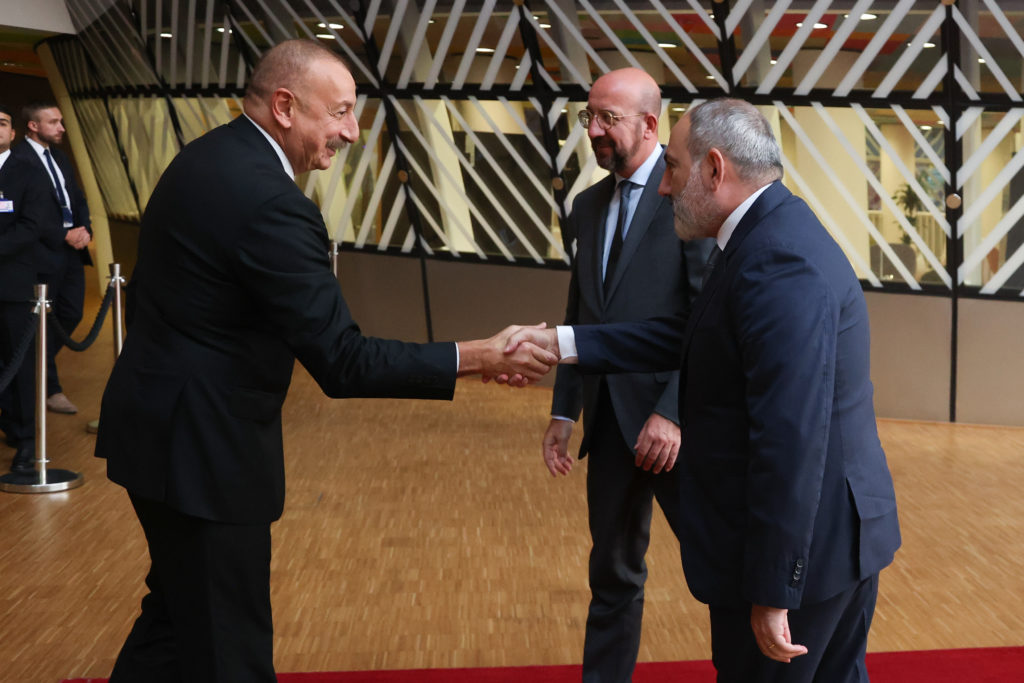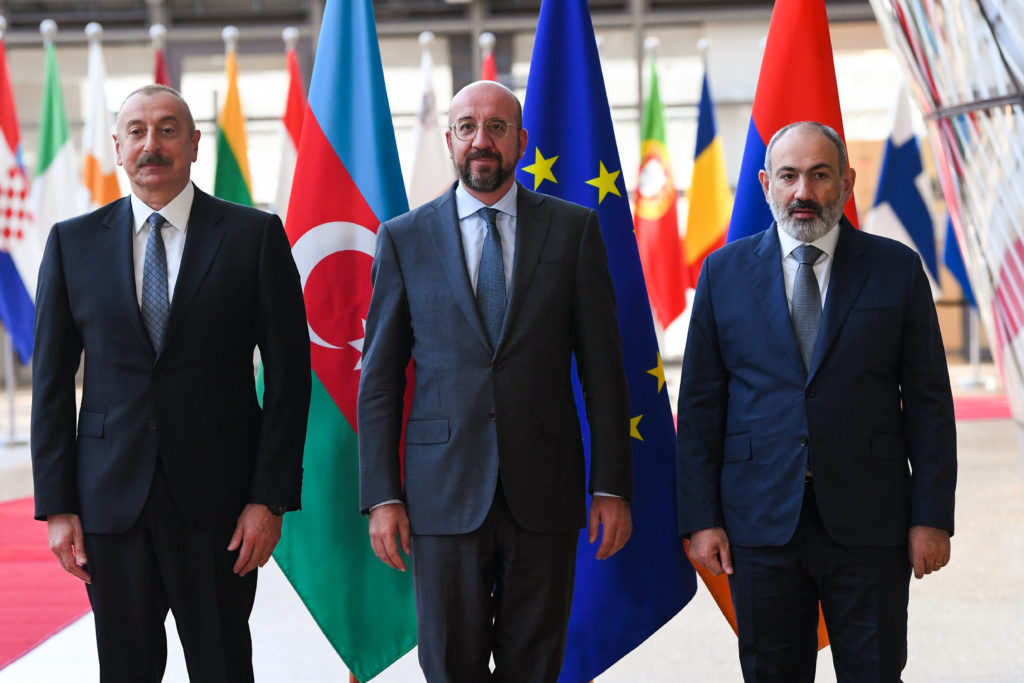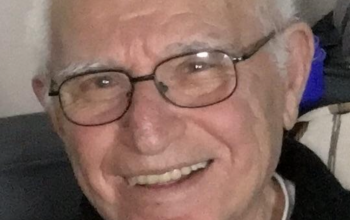By Lilian Avedian, Armenian Weekly
Armenian Prime Minister Nikol Pashinyan and Azerbaijani President Ilham Aliyev agreed to “step up substantive work” on a peace treaty during their fourth trilateral meeting hosted by European Council President Charles Michel in Brussels on August 31.
Michel praised the over four hour long meeting, during which the leaders also discussed border issues, humanitarian issues and connectivity, as “open and productive.”
“Today, we agree to step up substantive work to advance on the peace treaty governing inter-state relations between Armenia and Azerbaijan,” read a statement by Michel released after the meeting. The leaders resolved to task their Foreign Ministers to meet within one month to work on draft texts.
Michel has brokered two previous trilateral meetings with the South Caucasus leaders this year. During a trilateral summit in Brussels on April 6, Pashinyan and Aliyev agreed to start work on the preparation of a peace treaty.
Armenia accepted a five-point proposal from Azerbaijan in March regarding the elements that would be enshrined in a peace treaty, including mutual recognition of each other’s sovereignty and territorial integrity, mutual affirmation of the absence of territorial claims to each other and a legally binding obligation not to make such claims in the future. The Armenian side has also said that guaranteeing the security and rights of the Armenians of Artsakh and determining the final status of Artsakh should be part of a peace deal.
Pashinyan, Aliyev and Michel also “reviewed progress on all questions related to the delimitation of the border and how to best ensure a stable situation.” They decided that the bilateral commission on the delimitation of the state border will hold its next meeting in Brussels in November.
The commission held its second meeting the day before Pashinyan and Aliyev’s meeting in Brussels.
During the August 30 meeting hosted in Moscow, the sides “discussed organizational and procedural issues, exchanged detailed views on the regulation of the joint activity and further workings of the commissions,” according to near identical statements from the Armenian and Azerbaijani Foreign Ministries. They also “expressed gratitude to the Russian side for organizing the meeting at a high level.”

In a statement from the Russian Foreign Ministry, the Russian side “expressed readiness to continue consultative and technical assistance” on border delimitation, “promoting stability and security in the border areas.”
Pashinyan and Aliyev decided to launch negotiations on border delimitation during their previous meeting in Brussels on May 23. That same day, Armenian Deputy Prime Minister Mher Grigoryan and his Azerbaijani counterpart Shahin Mustafayev were appointed the heads of a bilateral commission on border delimitation and demarcation.
Grigoryan and Mustafayev held their first meeting on May 24 at an undisclosed location along the Armenia-Azerbaijan border. They “reiterated their readiness to work on delimitation and other relevant issues, including border security issues within the commissions,” according to the Armenian Foreign Ministry.
Pashinyan, Aliyev and Michel also “reviewed progress of discussions on the modalities for unblocking the transport links” during this week’s summit.
During their May 23 meeting, Pashinyan and Aliyev agreed on “principles governing transit between western Azerbaijan and Nakhichevan, and between different parts of Armenia via Azerbaijan” regarding “border administration, security, land fees but also customs in the context of international transport,” without identifying what those principles are.
The November 9, 2020 ceasefire agreement ending the 2020 Artsakh War states that, within the process of opening regional economic and transport connections, Armenia would provide transport links between the western regions of Azerbaijan and Nakhichevan in order to organize the unimpeded movement of citizens, vehicles and goods in both directions.
Aliyev has repeatedly called for the creation of a “Zangezur corridor” passing through Armenia’s southern province Syunik free of passport or customs controls, a demand that the Armenian government has rejected.
Pashinyan said that Armenia is prepared to facilitate transit between Azerbaijan and Nakhichevan “right today” and invited people from Azerbaijan to travel through Armenia to Nakhichevan during a cabinet meeting on August 4.
“We are ready to provide that connection every day during this time. It is Azerbaijan that does not take advantage of the opportunities provided by us. We still say today that in accordance with the procedure established by the legislation of the Republic of Armenia, come, cross the border of Armenia, go to Nakhichevan. Just today,” Pashinyan said.
Pashinyan, Aliyev and Michel also had a “detailed discussion on humanitarian issues, including demining, detainees and the fate of missing persons” this week.
“President Michel stressed to Azerbaijan the importance of further release of Armenian detainees,” Michel’s statement reads.
On August 30, Armenia’s human rights defender Kristine Grigoryan reported that 303 Armenian soldiers and civilians are still considered missing as a result of the 2020 Artsakh War, according to data provided by the International Committee of the Red Cross.
“The continuous Azerbaijani policy of providing distorted or no information at all on the prisoners of war, civilian captives and missing persons is a blatant act of using human rights issues for political purposes, violating all norms of international humanitarian law,” Grigoryan said.
Those considered missing include detainees whose status has not been confirmed by Azerbaijan who either remain in captivity or have been extrajudicially killed, according to Grigoryan.
The Armenian Foreign Ministry said it is “impossible to accurately estimate the number of missing persons” or “acquire reliable information regarding the fate or whereabouts of those disappeared, and whether they are still alive” due to Azerbaijan’s lack of cooperation.”
“With all these discussions, I would like to underline that it is important to take the population along on both sides and prepare them for a long-term sustainable peace,” Michel wrote in his statement.
“Public messaging is critical in this regard—in a sensitive situation like this every word spoken in public is obviously listened to by the other side and weighed,” Michel continued.
Meanwhile, the Lachin (Berdzor) corridor officially shut down on August 30, and Artsakh authorities said that Russian peacekeepers have been deployed to a new route connecting Armenia and Stepanakert.
On August 5, following Azerbaijan’s latest border attacks on Artsakh, Artsakh authorities announced that the residents of the villages Aghavno and Nerkin Sus and the town Berdzor along the Lachin corridor would have to evacuate their homes by August 25, ahead of the handover of those communities to Azerbaijan and the closure of the Lachin corridor.
The ceasefire agreement ending the 2020 Artsakh War states that Armenia and Azerbaijan would form a plan within the next three years for the construction of a new traffic route along the Lachin corridor, providing communication between Stepanakert and Armenia. Armenia commenced the construction of its portion of the alternate route this summer. Meanwhile, Azerbaijan’s President Ilham Aliyev said on August 5 that the Azerbaijani section of the road, which had been under rapid construction for months, is nearly complete.
By August 25, all of the Armenian residents of the three communities along the Lachin corridor had left. Yet the new route was not yet operational. The Artsakh Interior Ministry announced that the Lachin corridor would continue to operate until August 31 and that Russian peacekeepers would continue to ensure safe passage along that route.
Saleh Mammadov, the chair of Azerbaijan’s State Agency of Automobile Roads, said that since Armenia had not completed the construction of its portion of the highway, Azerbaijan had “undertaken the construction of another 4.8 kilometer road connecting to the new highway.” Mammadov said it would be “possible to use this highway within the next week.”
The five-kilometer road will function temporarily until Armenia builds its section of the route, which the Armenian government has announced will be completed by next spring.




